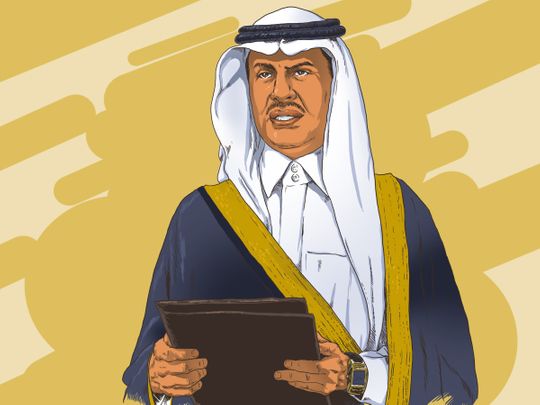
It’s an open secret that the economy of Saudi Arabia is built on oil — a dependency that Crown Prince Mohammad Bin Salman Al Saud is determined to break.
In his Vision 2030 plan outlined in April 2016, the Saudi Crown Prince laid out a progressive and futuristic vision of how he believes the kingdom will evolve economically, socially and technically.
Since then, he has overseen the diversification of the Saudi economy, created new revenue streams, loosened restrictive practices and set out plans for a portion of Saudi Aramco, the world’s largest oil producing company, to go public.
Any initial public offering of as much as 5 per cent of Aramco is expected by the kingdom’s leadership to raise at least $2 trillion (Dh7.34 trillion). Now, with the appointment this week of Prince Abdulaziz bin Salman as the new Saudi energy minister, that flotation takes a significant step forward — with a responsibility on the new minister to maximise its value.
He takes the reins at the world’s largest oil exporter from Khaled Al Falih and faces the challenge of bringing Aramco IPO to fruiting, maximising its value and ensuring that oil values remain at optimum pricing levels to reinforce the broader Saudi economy
The king’s son is already a veteran oil official well-known for his work within the Organisation of Petroleum Exporting Countries (Opec).
He takes the reins at the world’s largest oil exporter from Khaled Al Falih and faces the challenge of bringing that Aramco IPO to fruiting, maximising its value and ensuring that oil values remain at optimum pricing levels to reinforce the broader Saudi economy.
He’s an excellent negotiator and has long experience in cutting deals within Opec — and that well-found respect among fellow members can help him implement that drive.
“He will focus on enhancing the relationship within Opec and with non-Opec producers to strengthen the stability of the international oil market,” a Saudi official told Reuters.
Bassam Fattouh, head of Oxford Institute for Energy Studies and a regular attendee of Opec meetings, said he believed that the prince’s appointment represents “a continuation of existing policy”.
World’s biggest IPO
“The prince has been a key shaper of Saudi oil and Opec policy for many years,” Fattouh said, adding that he has also been a key player in domestic oil policy such as the kingdom’s energy pricing reforms, renewables and energy efficiency.
Gary Ross, a veteran Opec watcher and founder of Black Gold Investors, said he first met Prince Abdulaziz in early 1980s.
“There is no one in the kingdom who knows more about oil than Prince Abdulaziz,” said Ross who said he believed the new minister will maximise revenues for Saudi Arabia.
“I expect no policy change — the objective is to deliver higher prices and the IPO for Aramco,” said Amrita Sen, co-founder of Energy Aspects think tank, which closely follows Opec policies.
The Aramco IPO is expected by 2020-2021 and firmer oil price levels will help achieve that $2 trillion valuation figure.
Prince Abdulaziz’s appointment broke with long-held tradition that saw oil technocrats and non-royals overseeing the energy portfolio in the kingdom. Saudi Arabia has had five oil ministers since 1960, and none of them has been a royal.
Prince Abdulaziz joined the oil ministry in 1987 and worked closely with previous oil ministers Hisham Nazer and later with Ali Al Naimi as his deputy for years.
Crown Prince Mohammad first announced plans for an initial public offering of the company in 2016, saying up to 5 per cent of the company would be sold publicly. The government has since delayed the timing of the IPO, most recently to finalise a deal that saw Aramco acquire a nearly $70 billion stake in Saudi petrochemicals firm Sabic.
Even at the lower end of valuation so far anticipated by energy and market analysts, a partial listing of Aramco would potentially be the world’s biggest IPO ever. Crown Prince Mohammad plans to transfer funds from Aramco to the sovereign wealth fund and use those earnings, from investments abroad, to support large-scale local development projects that can create millions of jobs for young Saudis.
Handling the Aramco file
The 59-year old is the fourth son of King Salman. Prince Abdulaziz attained a science degree in industrial administration at the King Fahd University and later, in 1985, earned a Master’s in Business Administration from there specialising in the same field.
He began his career as a lecturer in energy studies at the university’s school of Petroleum and Minerals. He later served as its manager of economic and industrial research before becoming an adviser at the oil ministry in 1987. All of that experience will be needed in handling the Aramco file.
Amin Nasser, Aramco’s CEO said last week the company will be ready to list on the Saudi stock exchange though he declined to say how much of Aramco would be listed on the Tadawul exchange or when the company would list internationally.
Speaking in Abu Dhabi last Monday, Prince Abdulaziz made it he will support the production cuts agreed to by the “Opec plus” group. The cuts have largely been shouldered by Saudi Arabia, and while they did drive prices higher, some speculate, perhaps not high enough to help that IPO valuation.
— With inputs from agencies
Mick O’Reilly is the Gulf News Foreign Correspondent based in Europe.









